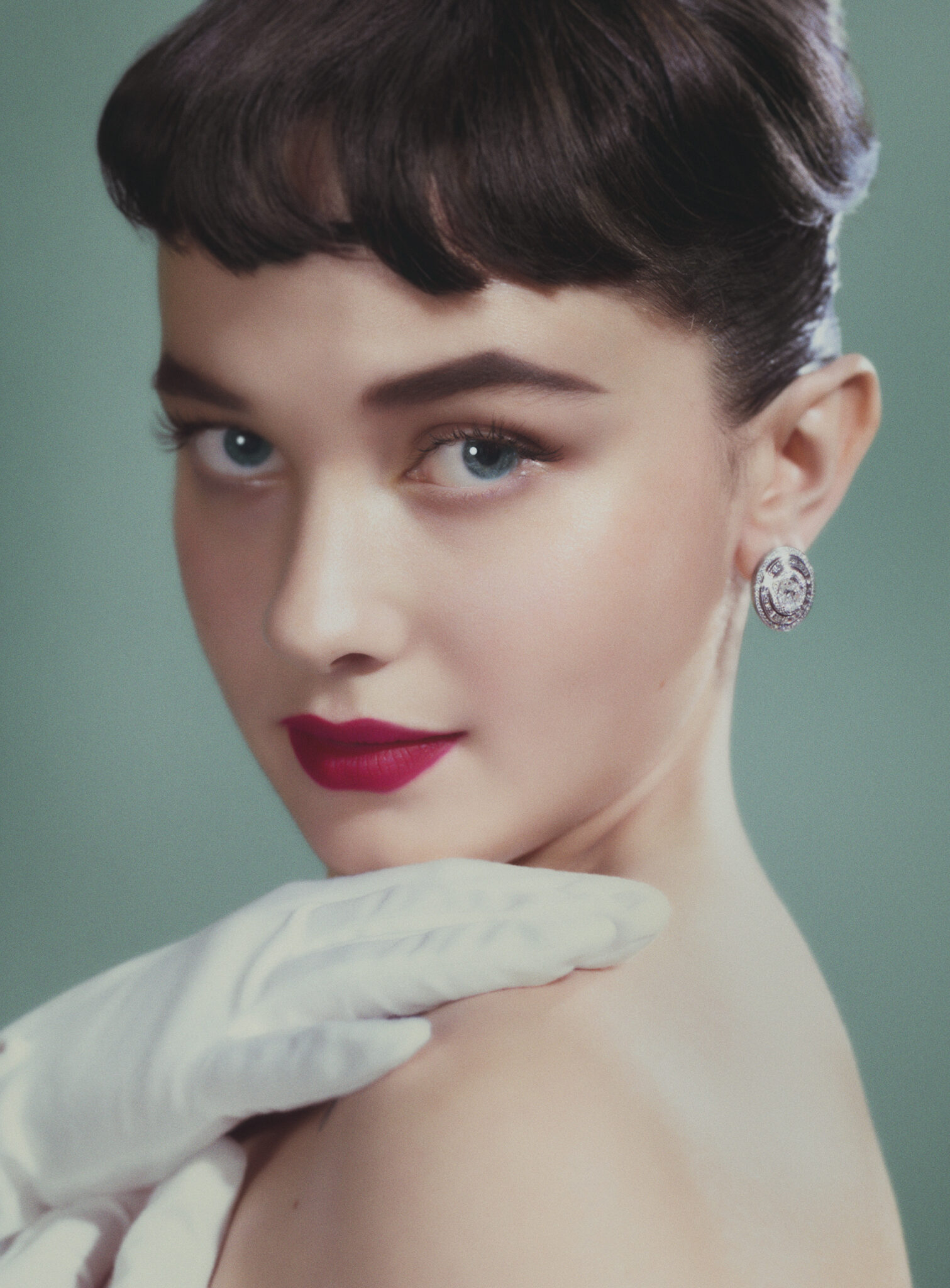Fourteen is not an age most people are eager to revisit.
It is a time of doubting everything, reckoning with the sudden emergence of acne, hair, boobs (or lack thereof), and feeling so close to adulthood while still being, for all intents and purposes, a child. It’s the most fertile age for insecurity to blossom, yet it’s also when a lot of young people start to feel more certain in their voice and sense of self—however in flux that identity may be. When Priscilla Presley was fourteen, she met the biggest rockstar in the world, Elvis Presley, and convinced her parents to let her be with him. When Cailee Spaeny, the actor who portrayed Priscilla Presley in Sofia Coppola’s latest film, Priscilla, was fourteen, she had dropped out of school and, similarly, convinced her parents to let her perform. As Spaeny tells me, “Don’t underestimate a determined fourteen-year-old girl. They’re the most powerful thing on earth.”
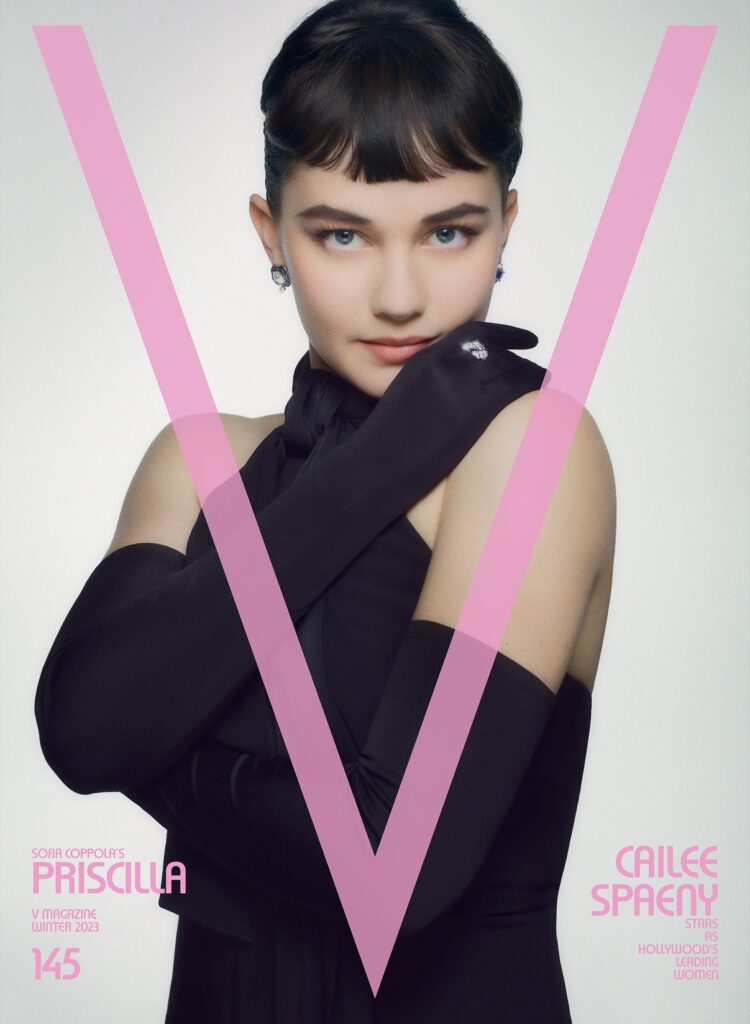
In the eleven years since giving her parents the ultimatum, Spaeny has starred alongside A-listers like Dakota Johnson, Felicity Jones, and Kate Winslet, she closed Miu Miu’s SS24 runway (following supermodel Gigi Hadid), and now, she’s fulfilled one of her biggest dreams, playing the lead role in a Sofia Coppola film. Talking to her over Zoom—Spaeny tuned in from London the day after her runway debut—it’s obvious (and very charming) that she’s in disbelief over her newfound It-girl status. “Okay, cool girl,” she says when I tell her I’m tuning in from Manhattan’s East Village. I remind her that she’s about to fly to New York for the American premiere of her latest movie, Priscilla—arguably way cooler than mouse traps and pre-war plumbing—and she demures, “I’ll be slightly intimidated, but it should be fun.”
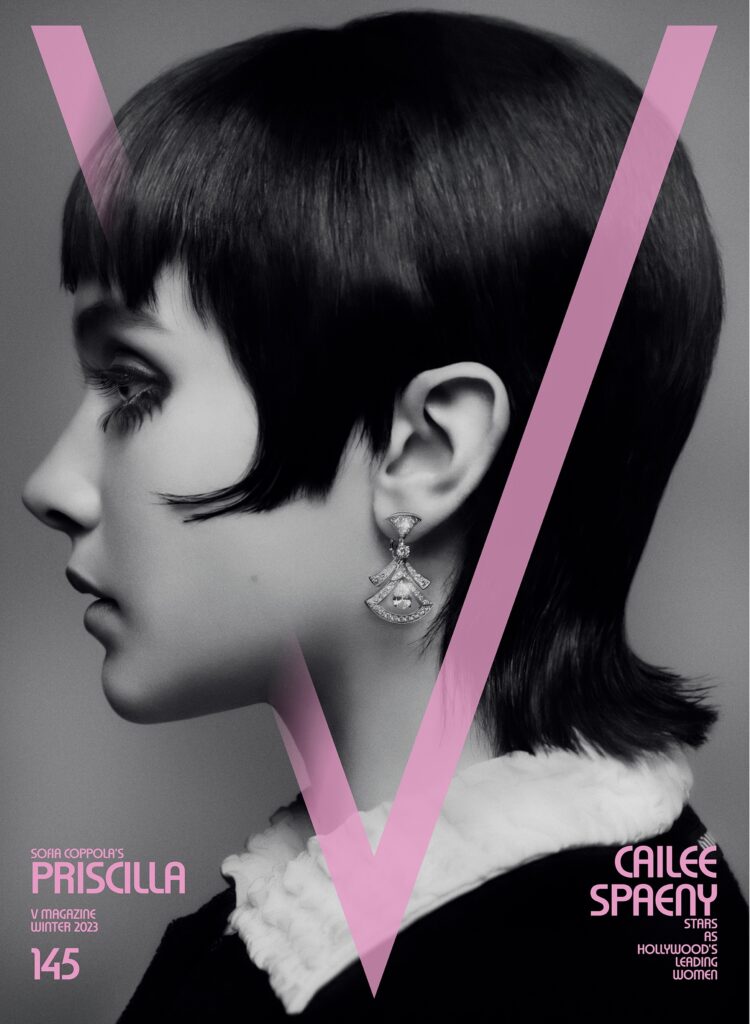
Throughout our conversation, Spaeny gushes the way any 25-year-old would gush if she were cast in a Coppola film, while still possessing a sense of pragmatism when it comes to the industry’s attention span. It’s refreshing. It’s real. It makes you wonder about her journey to Priscilla, and to stardom. Between her hotel room in London and my girlfriend’s apartment on 5th Street, we chat about the actress’ colorful life in Southern Missouri, IRL conversations with Priscilla Presley, life on a Sofia Coppola set (pickleball tournaments included), her tribute to the stars of yesteryear in her shoot with V, and the pep-talk she got from Gigi Hadid right before closing the Miu Miu show. When I ask how she feels about her impending rise, she cites the advice she got from Hadid about how to walk the runway: “Take in how the room smells, take in all the details. Because you don’t want to blank and not remember these moments.” Thanks, Gigi.
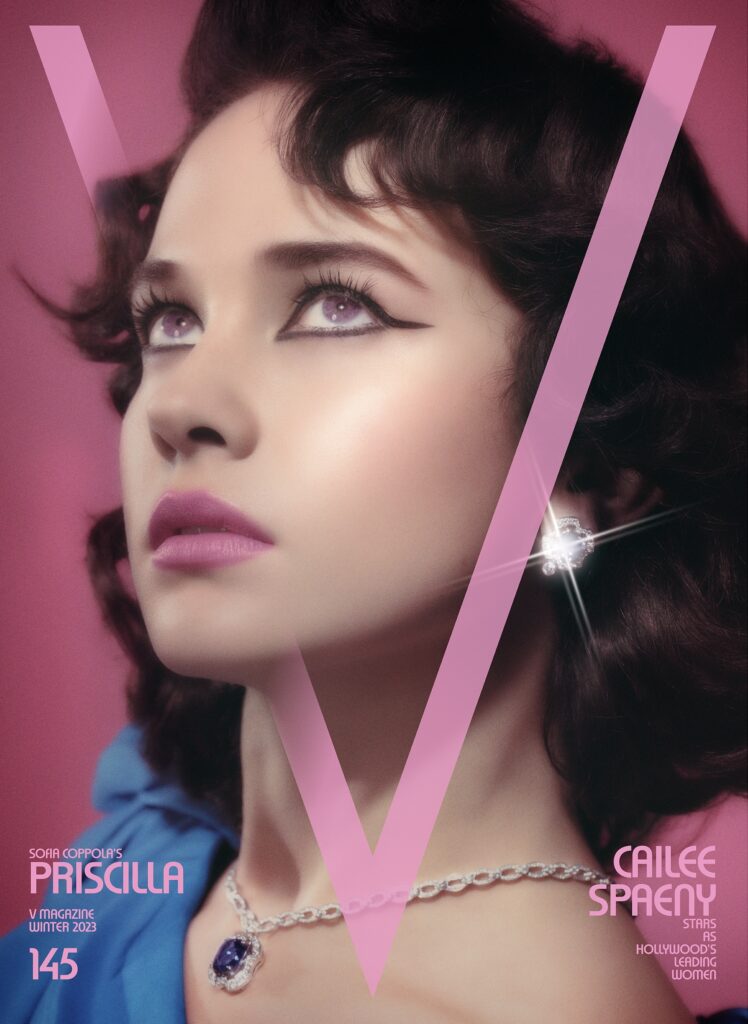
V Magazine: Is this your first cover story? Just out of curiosity.
Cailee Spaeny: I think so? The press for this film has been the most full-on, extensive amount of press that I’ve ever done in my life.
V: I guess when you’re in and out of shoots you’re kind of like, where is this gonna go?
CS: Yeah! Like, I hope I looked okay. I hope I sound somewhat intelligent.
V: Totally. So, I’d love to know more about you. Where are you from?
CS: I was born in Knoxville, Tennessee and I was raised in southern Missouri. Sort of the Bible belt of the world. I’m one of nine siblings. I’m the seventh.
V: You’re the seventh! What has your family’s reaction been to all this?
CS: It’s definitely been big. Elvis is American royalty but in the South, he’s like a God. My mom was a mega-fan. She collected Elvis memorabilia and had, like, a shrine of him.
V: Really?
CS: Full on. She named one of her kid’s middle names after him. She had all of his albums. We grew up going to Graceland on vacations. I have this vivid memory of walking around and hearing “If I Can Dream” on the speakers, looking up at my dad, and seeing him tear up. That really stuck with me. It was exciting to get to dive into this world I knew and loved but through the eyes of this teenage girl.
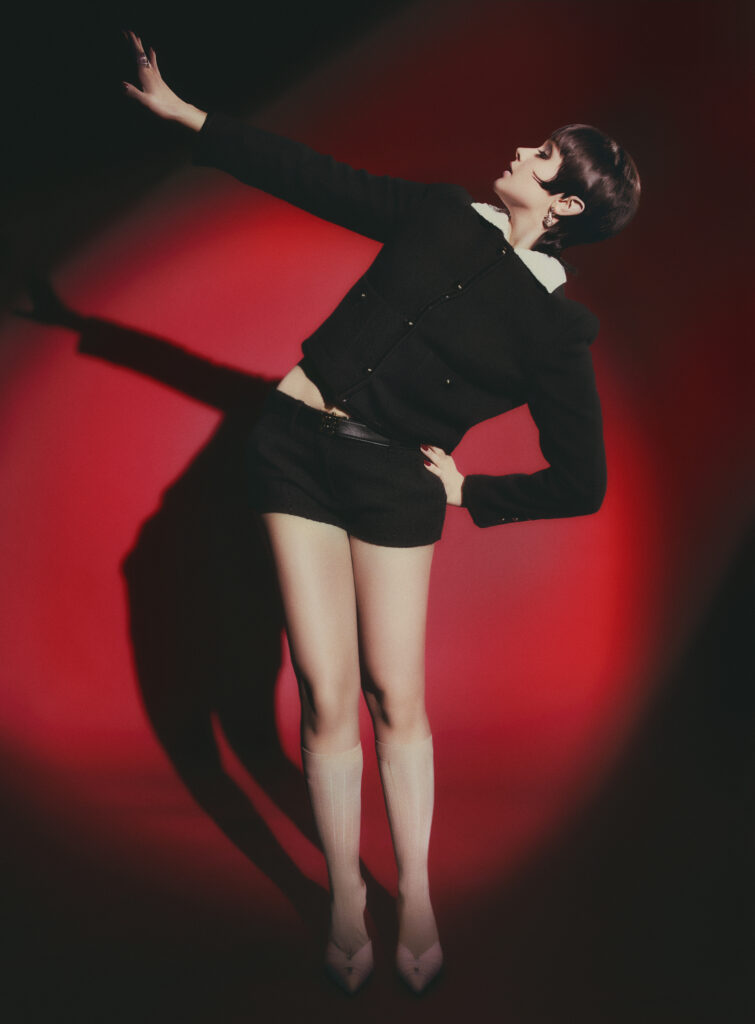
V: What was your way into that story?
CS: I read Prescilla’s memoir and Sofia’s script was heavily influenced by that, but the key part was meeting Priscilla herself. Most of her time on Earth has been her life with Elvis and retelling that story. She wanted to be as open and honest with me as possible and let me know that I could call her at any point throughout the filming process.
V: Did you ever take her up on that?
CS: Right up until we started filming, I called on her just to go over how her relationships were with each person in the story—specifically the Memphis Mafia. How was she around those guys? Did she lean back or did she feel like she needed to be one of the guys? She would say, “All the guys had wives. But I didn’t feel like I could get close to the wives either because I knew things about the husbands that I could never tell the wives.” That spoke to her isolation on a different level. Because this film is so impressionistic and more about the mood and emotions, those little details matter. She told me she was starving when she went to Elvis’ place in Germany the first time they met. When she was offered by Elvis to have a bacon sandwich, she said, “No,” because she was like, “I cannot eat a bacon sandwich in front of Elvis Presley.” [But] I really tried to sit back and see what she felt comfortable talking about even if it had nothing to do with Elvis.
V: Did you relate to her story?
CS: She was an [Air Force] brat and never felt like she could connect with her peers. From a very young age, she understood the meaning of loneliness. I dropped out of school when I was 13, so I didn’t have connections to kids my own age either. I was always around adults. She was always told when she was younger that she was an old soul and that’s something that I continuously got when I was around that age as well. She was always really quiet and observant of people which I—people always commented that was how I was too. So that was a way in.
V: You said the script kind of found its way to you. How did that happen?
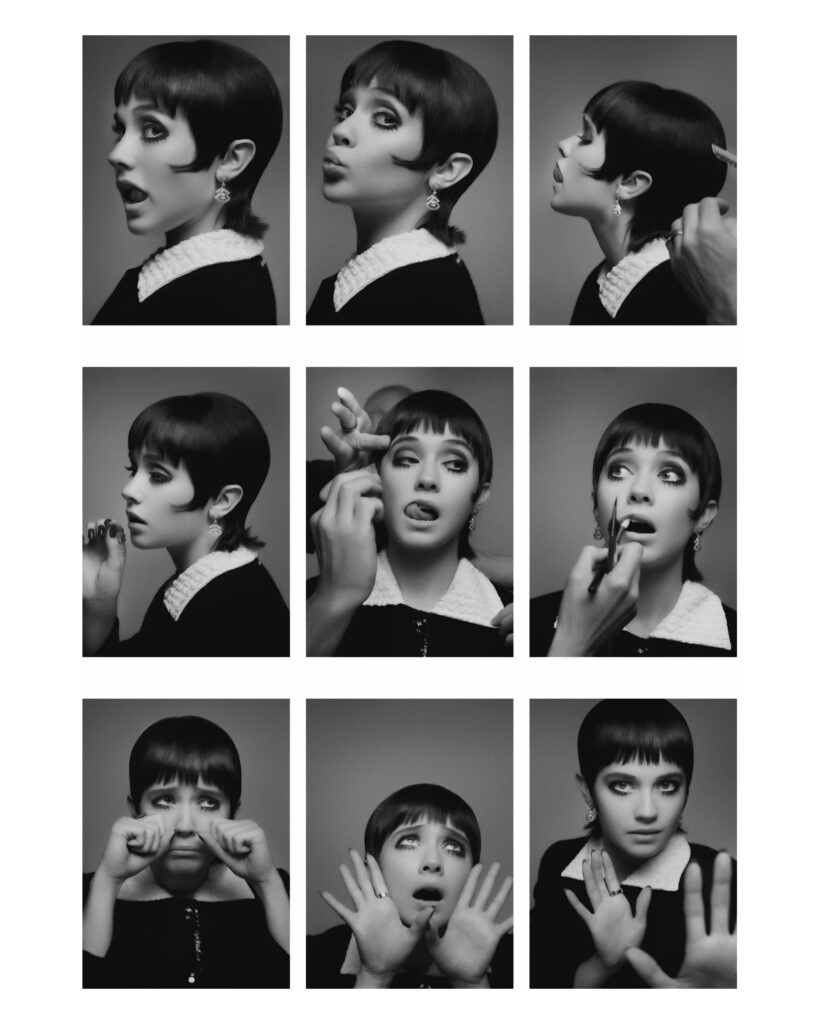
Earrings and ring BULGARI / Jacket MIU MIU
CS: I mean, Sofia was genuinely my ultimate director when I was a kid. When I found Virgin Suicides, it was the first time I thought, “Who’s behind the camera?” Finding out it was a young female director was so exciting. She was like nobody else. I don’t know if she even remembers this—she was trying to put together this movie The Little Mermaid and I auditioned for her. It was the first callback I got in Los Angeles, [but] that film ended up not going through. Francis’ producer knew about me through those auditions and I ended up doing a table read for [forthcoming Francis Ford Coppola film] Megalopolis. So, the Coppolas always ended up coming back around in this funny way…
V: That’s surreal.
CS: It was really strange… I got a call one day saying, “Sofia wants to meet you in New York,” with no context. I didn’t ask any questions, just packed my bag and got on a plane.
V: As you do.
CS: Sat down with her, had some coffee and a croissant, and we had a nice conversation, but I’m wondering what’s going on here. She pulled out an iPad and started showing me photos of Priscilla and said, “I want to do a movie on Priscilla Presley, I think you could play her.” There [were] gonna be talks of auditions but then Kirsten Dunst—obviously her muse–put in a good word for me and that, I think, was the final step. The crossover of those worlds was absolutely wild.
V: I can’t imagine that. Being 15 and auditioning, and the Coppolas are calling you… I mean…
CS: Yeah, I’ve done some real manifesting for this. Now I don’t know what to do with myself! That was the dream goal and it happened in such a magical way, so I gotta go back to the drawing board now.
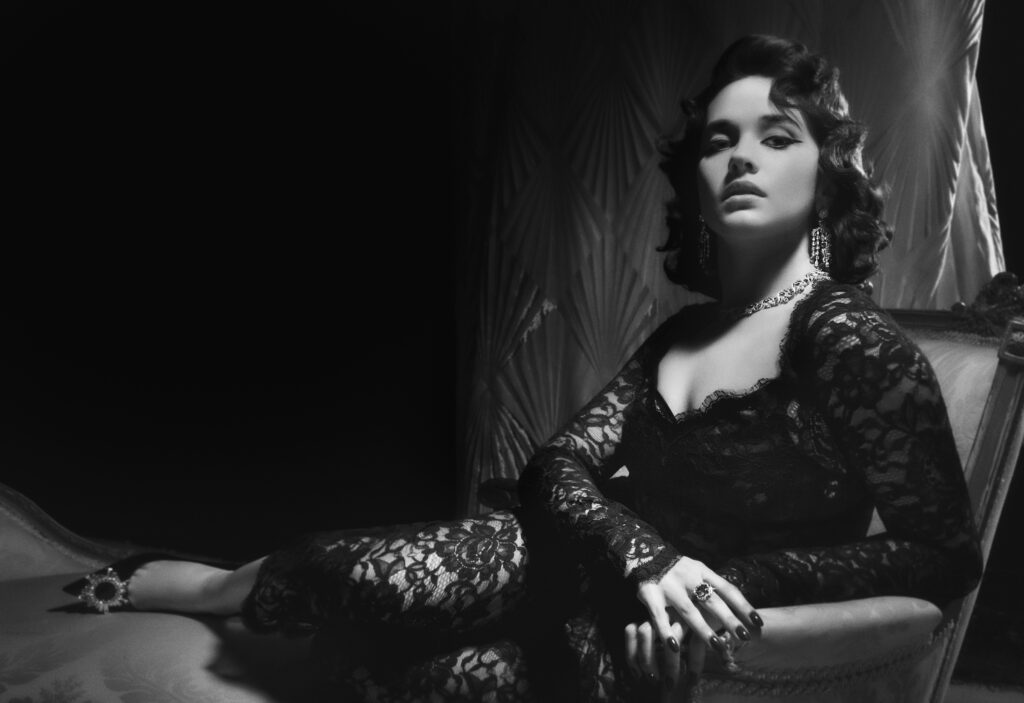
V: And make a new dream goal!
CS: I don’t know how it gets better than this though.
V: We kind of glossed over this, but you said you dropped out of school at 13.
CS: Yeah.
V: To pursue acting?
CS: Well, no, acting sort of followed that. I was really terrible at school. Teachers loved me. I just didn’t test well. I didn’t understand how to get my brain to work in a certain way that seemed like everyone else could. So, I dropped out and I started doing theater. Small town musical theater and like cheesy musicals. I also was in a cover band, writing my own music… taking piano lessons, guitar lessons, then started performing at a theme park… I would do infomercials… anything I could get my hands on in terms of entertainment in the southern Midwest. I ran out of things to do and begged my parents to take me to Los Angeles. It’s funny, it wasn’t until after the film that I put together that that was the same age that Priscilla gave her parents that ultimatum. Priscilla’s like, “I would’ve gone if they told me yes or no,” and I was the same way at 14. If my parents were gonna help me, great, but if they weren’t, I was gonna find my way. But they did help me and I understood the seriousness of that. We would take the minivan and drive from the prairie to Los Angeles which was about a 25-hour drive. We didn’t have a lot of money. We stayed in crap hotels. We stayed at friends’ places. We would end up with random families that we met at church events. We’d stay in one room for four months, on two cots and an air mattress with my mom and two other siblings. The weight of that hit me. If I’m being really honest, it was a dream of mine. I had a lot of passion for it, but I also knew I had to make this work. I auditioned for four years without hearing anything. Don’t underestimate a determined 14-year-old girl. They’re the most powerful thing on earth.
V: Yeah, they are.
CS: It’s so interesting… the parallel.
V: It’s a parallel most people wouldn’t be able to have. It’s very unique.
CS: I think it took me completely feeling lost, not knowing what to do with my life, and failing, to shift gears at the age of 14 and try to make some gameplan. Priscilla was the same in the sense that she did not want to be in Germany, she couldn’t make any friends. Then she fell in love and she saw this other life and she was determined to follow that.
V: She wanted to get that other life. Yeah, that’s remarkable. Truly. Congratulations.
CS: Thank you.
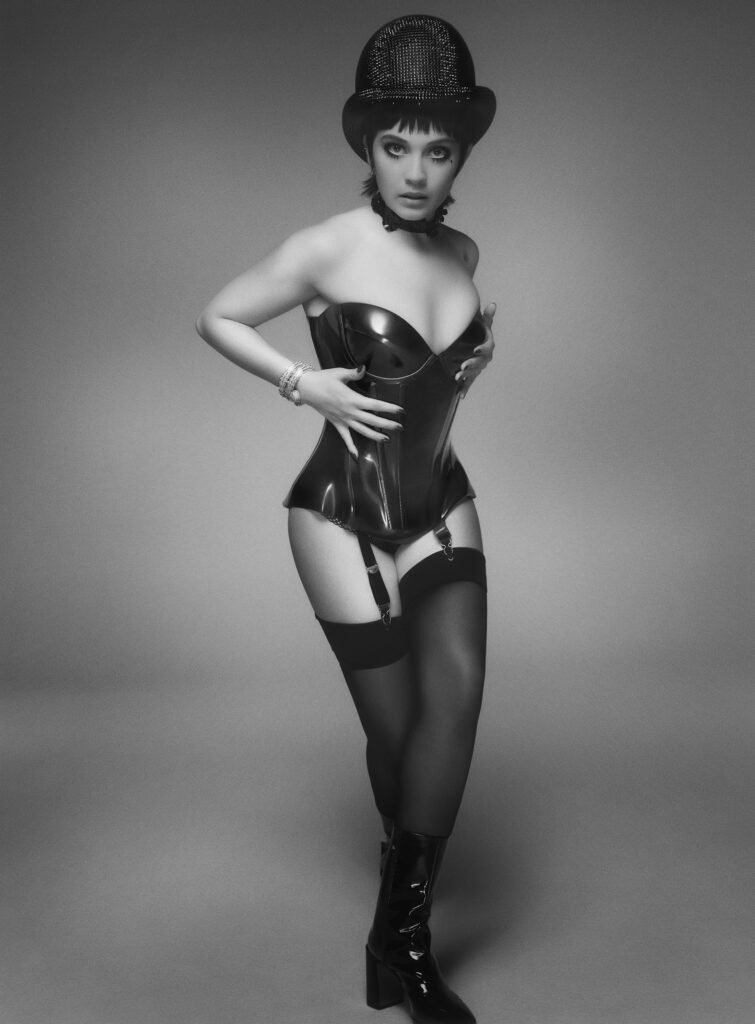
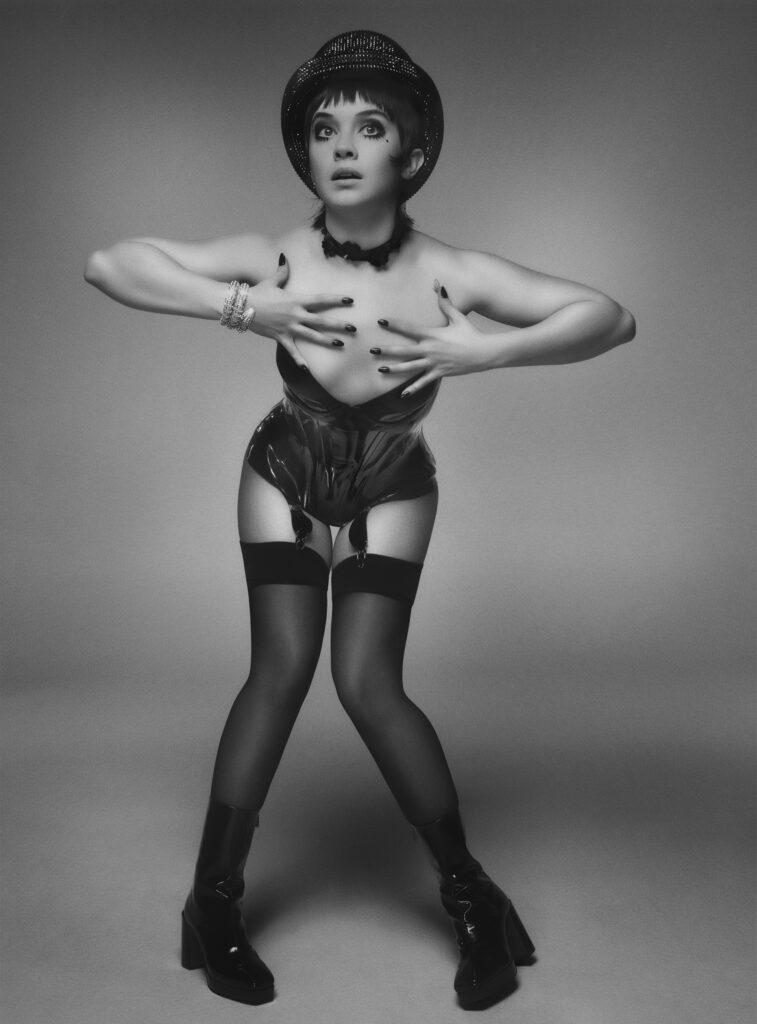
Jewelry BULGARI / Corsets, briefs, suspenders, choker ATSUKO KUDO / Hat PHILIP TREACY / Stockings WHAT KATIE DID / Shoes CHRISTIAN LOUBOUTIN
V: So, tell me about the shoot. What was it like working with Sofia? What was it like on set?
CS: We shot it in Toronto. We only had 30 days to film this movie, which is not a lot of time to get a film of this scale down in the right way, especially when it comes to locations, hair, makeup, and costume changes. We had more costume changes than page count—
V: Whoa!
CS: Fittings were very extensive. Stacey Battat, our costume designer did a fabulous job with the budget we had and the person I was playing, who’s such an icon in fashion. With Jacob and I… Jacob stayed in the accent and vibe when we were filming and therefore, I did too—not that I’m method. When you’re in it, when all you do is go to set and think about this character all day for 30 days, it just sort of lingers around. Jacob and I took the time to really get to know each other before we started filming. The second I knew he was cast, I emailed him, and I started setting up bonding activities. (Laughs.) We went horse riding in LA because Elvis and Priscilla did that. I think we work in similar ways. He was a great study buddy and he had a really massive task ahead of him: playing an Elvis that was sort of behind closed doors [and] from Priscilla’s perspective. I think he did it beautifully.
V: And Sofia?
CS: Sofia is such an interesting director because she’s so soft-spoken. A lot of the time directors command authority onset through having to prove themselves, usually by being the tough guy. But Sofia is the exact opposite of that. Her friends say she’s like an iron fist in a silk glove. She makes playlists to get the cast and crew in the mood. She had a pickleball court that she made on set. It turned into a whole thing. We had a full-on tournament. People are at their best and most creative when they feel relaxed and comfortable. She knows exactly how to do that and she does it with such kindness and grace. It’s a dream to work on her sets and fascinating to watch her in action.
V: It sounds like summer camp in heaven.
CS: It genuinely was! I mean, other than the massive amounts of pressure to get this role right, it was like summer camp.
V: Do you remember any of the songs she had on the playlists?
CS: Well, she loves Prince. I adore Prince. Prince was on my wall as a child.
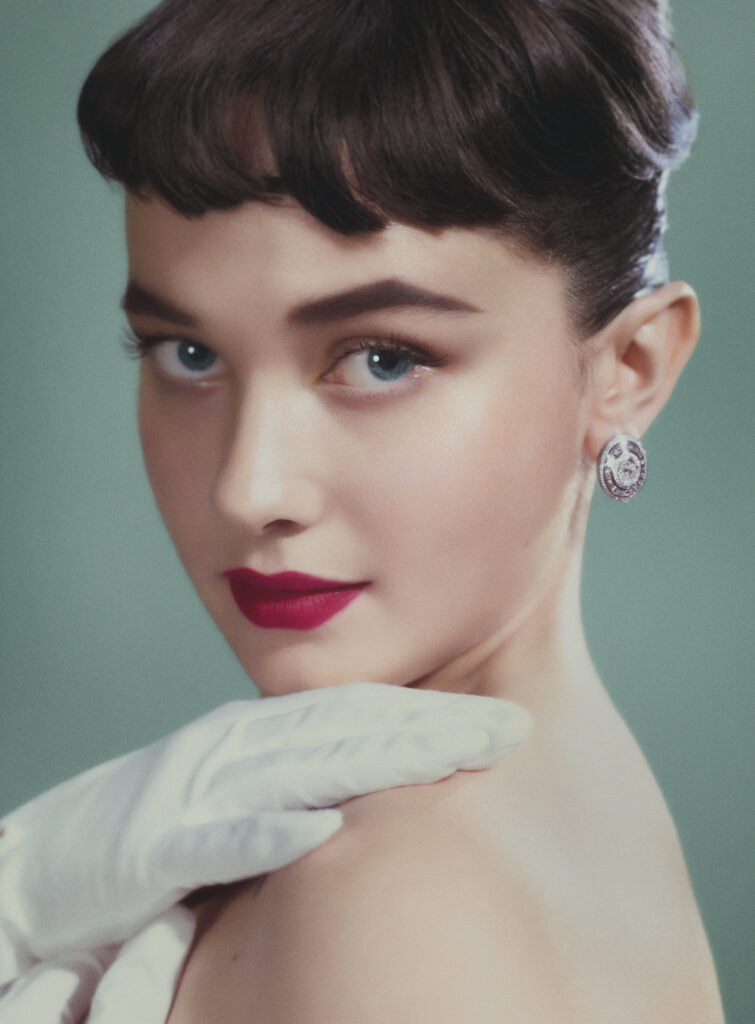


V: Oh, that’s cute.
CS: That was a fun thing to bond over. There was a Prince song I hadn’t heard before, I think it’s called “Starfish & Coffee.” She decided that Mazzy Star’s “Fade Into You” was my song. I’d come in a new pastel dress, new hairdo, tons of eyeliner, and high heels, and I’d walk into this beautiful candy-colored Graceland and she’d play Mazzy Star’s “Fade Into You.” It holds such a special place in my heart whenever I hear it now. Obviously, for the last frame, “I Will Always Love You” plays. It was very important to [Coppola] to have a speaker in the back of that car. She was like, “Make sure there’s a speaker in the car so Cailee can hear the song.” I think it was on day one when we shot that [last] scene. It was incredibly out of order.
V: I love the choice of “I Will Always Love You” at the end because it really feels true to Priscilla’s story.
CS: Dolly is such a big part of the South and I grew up with her as well, but that song held a really special place for Priscilla because as she and Elvis were getting divorced, Elvis sang “I Will Always Love You” sort of whispering into her ear as they’re leaving the courtroom. To know that it was actually a song between Elvis and Priscilla at the end of their relationship is kind of wild.
V: It is wild. What a flair for drama, Elvis.
CS: Crazy.
V: As I’m sure you know, Sofia often revisits her muses as she has with Kirsten Dunst and Elle Fanning. How do you see your relationship with her working out in the future?
CS: I have no idea. I mean, I would absolutely love to work with her again. I would do anything in cast or crew, I would be a background, I would assist, I would literally do anything. If she’d have me, I would take it in a heartbeat. But, this experience as a whole, I’m just trying to savor it, because it’s such a special moment in my life.
V: Of course. I have a question that may require you to look outside and into yourself, but what do you think is that quality that draws Sofia to certain women?
CS: God. Do I have to like, compare myself to Elle Fanning and some of the best actresses around? (Laughs.) I don’t know. When I watched [Coppola’s films], what I found really freeing was that she’s not afraid to lean into or underestimate a teenage girl’s loneliness and sadness. What they long for, yearn for, their hopes and dreams, and their crushes. She said this before, too, that she felt annoyed by the way that teenage girls were depicted in movies. I think she completely flipped that narrative on its head. That’s why when young women watch her films—even if it’s something you haven’t confronted as a young girl—there’s something inside you bubbling. To have that sort of seen and confirmed in me was so freeing. So, I guess for those young women that she works with, it’s something that they also feel. Imaginative young girls who’ve had a relationship with loneliness and aren’t afraid to confront that just as she has through her films. That would be my first guess.
V: That’s a good answer! So the shoot for V was inspired by the stars of yesteryear and this golden age of Hollywood. Do you have a relationship with any of the women that you portrayed? In this case, it’s Liza [Minnelli], Audrey Hepburn, and Liz Taylor.
CS: As a young actress, I think it’s important to go back and look at the women who paved the way. In different ways, they were all unapologetically themselves. I find them fascinating on-screen and off-screen. I’m having a lot of fun in terms of fashion looking at these timeless beauties who have what I think we lack in today’s age: mystery. That’s what keeps us coming back to them, they kept something to themselves. They leaned into the performance of being a star.
V: Speaking of fashion, you recently walked Miu Miu’s runway.
CS: I did that yesterday.
V: Literally yesterday. What the heck? What was that like?
CS: I know! But no one told me I was closing the show. I went there for my fitting and they were like, “You’re our little surprise at the end!” I was like, “What do you mean?” and they went, “Yeah, you’re closing the show.” I was thanking the fashion gods that they’re bringing the sandal back so I didn’t have to go up those stairs in heels. We were all lining up and I was so nervous. Then Gigi got there and she said, “Okay, so how are you feeling?” and I said, “Well, Gigi, I don’t know. I’m nervous…” and she said, “No, you go at your own pace and don’t let anyone tell you what to do.” She said, “You look right in the middle of those photographers. That’s the best angle. You just do your own thing. All you have to do is walk and take your time.” And I was like okay, Gigi, okay. Then we got off the stage and she turned to me and she started screaming, “How do you feel!?” and I was like, “I feel like a rock staaaaaar!”
V: Yeah!
CS: She was so supportive. She was like, “And that’s what we call closing the show.” She’s so cute. She really rooted me on. I was like, I can’t believe I’m getting runway advice from one of the best models of our times. This is so cool. (Laughs)
V: Like, unbelievable.
CS: The theatrics and the pace and the energy are just crazy backstage. I felt like I was doing theater. Pat McGrath did the makeup and she was like a mother to everyone. She grabbed my hand and was like, “We’re so happy to have you.” I was like, “What’s going on?!” I don’t think I ever want to sit at another show again. I want to walk all of them. Miu Miu’s been really good to me. And the collection was absolutely beautiful.
V: It was! There’s nothing cooler than a Miu Miu girl. You likened this runway to a theater production and I feel like right now this is kind of your moment before the curtains are about to lift. You’ve rehearsed this show, the industry people have seen it, and now your name is going to be up in lights and everyone is going to know you. How have you prepared for that?
CS: Is that what’s gonna happen?
V: I think so…
CS: I think the best thing to do is not prepare. Oh, Gigi did say… “Take in how the room smells, take in all the details. Because you don’t want to blank and not remember these moments.” I feel like I sort of did that when I accepted the [Volpi Cup]. I was so nervous. So, I’m just trying to breathe, accept that I put a lot of hard work and thought into it, and just enjoy it because I’m a very lucky person. I’ve got good people around me, I get to travel, and I like the film that I’m promoting—which doesn’t always happen. But the biggest compliment that I could have gotten was after the festival. Priscilla came up to me and said, “I saw my life through you.” I don’t need anything else. Now I get to enjoy. That was all I needed to hear.
This story appears in the pages of V145: now available for pre-order!
Photography Rob Rusling
Fashion Anna Trevelyan
Makeup Laura Dominique (Streeters) using Dr. Barbara Strum
Hair Franco Gobbi (Streeters) using Fragile Cosmetics
Manicure Julia Babbage (Frank Agency)
Set design Tobias Blackmore
Executive producer Fabio Mayor (fe Creatives)
Digital technician Matthew Aland
Photo assistants Adam Roberts, Bradley Polkinghome, Oliver Webb
Stylist assistant Kit Rimmer
Hair assistant Stefano Mazzoleni
Retouching Studio-RM
Location Big Sky Studios
Discover More












